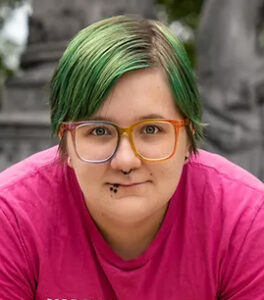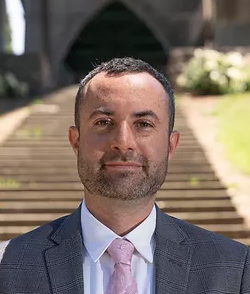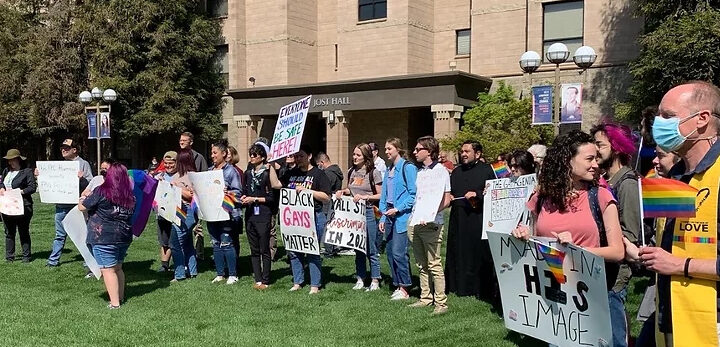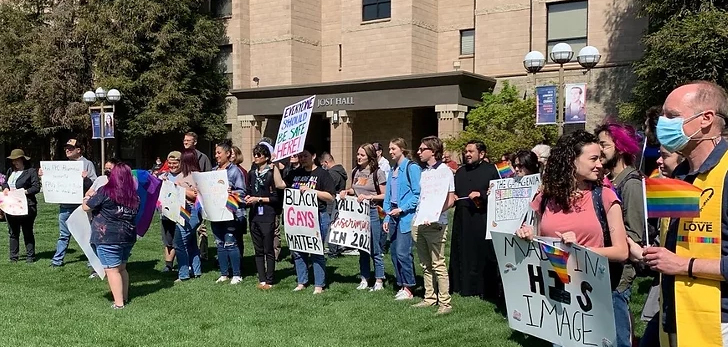A class action lawsuit accusing the U.S. Department of Education of wrongly allowing discrimination against LGBTQ students at faith-based schools has grown in number of participants and in general support over the past 15 months.
The Religious Exemption Project filed its lawsuit March 31, 2021, challenging Title IX exemptions granted to religious schools that received tax dollars through grant and scholarships.
Title IX currently applies to all schools that receive federal funding, including private religious institutions: “No person in the United States shall, on the basis of sex, be excluded from participation in, be denied the benefits of, or be subjected to discrimination under any education program or activity receiving Federal financial assistance.”
After the Education Amendments of 1972 were passed, discrimination based on pregnancy, sexual orientation and gender identity also became prohibited.
However, private religious institutions are allowed to request exemptions based on their religious beliefs. The REAP lawsuit argues that all schools that accept federal funds should adhere to the entirety of Title IX.
“Plaintiffs ask this court to declare that the religious exemption to Title IX, as applied to sexual and gender minority students, is unconstitutional and that the department must enforce the protections of Title IX at all taxpayer-funded educational institutions, including at those institutions that discriminate and cause harm on the basis of sincerely held religious beliefs,” the lawsuit states.
The lawsuit began with 33 plaintiffs and now has expanded to 46 plaintiffs. After news of the lawsuit spread, hundreds of LGBTQ people from religious institutions reached out to be included, according to Paul Southwick, director of REAP.
“We can’t add everyone to the case because it becomes a little bit unmanageable at a certain point,” Southwick said. “The idea of our case is that while we have 46 plaintiffs, they are standing in the shoes of all the queer, trans and nonbinary students in these spaces. They’re representatives of the larger community.”

Devin Bryant
One of the newer plaintiffs, Devin Bryant, was expelled from Christian Covenant Academy in Colleyville, Texas, according to the lawsuit.
“I feel like the reason why I was expelled wasn’t due to ‘struggling with same-sex attraction,’” Bryant said. “I feel that the problem is that I was comfortable with my queer identity.”

Mortimer Halligan
Mortimer Halligan, a student at Indiana Wesleyan University, is a member of an LGBTQ group on campus. However, the university will not allow them to become an official student group, and they meet off campus for safety purposes.
“I would like to feel safe on campus,” Halligan stated in the lawsuit.

Jamie Lord
Regent University School of Law student Jamie Lord has faced discrimination for identifying as a lesbian. Before attending the law school, she was assured her sexuality would not affect her time at the university. When she actually arrived on campus, this was not the reality. She was told she could be “kicked out of school” if she brought her girlfriend on campus.
“A teacher told me I would go to hell for being a lesbian and that if I prayed hard enough, God would save me from my sinful ways,” Lord said in the lawsuit.
REAP has helped the plaintiffs report incidents of LGBTQ discrimination to the Office of Civil Rights of the Department of Education. The U.S. Department of Justice initially stated on June 8, 2021, it would defend religious exemptions under Title IX; however, the Biden administration seemed to change its tune recently. Three investigations were opened by the Biden administration, according to a news release published on May 4.
Southwick said most of the plaintiffs filed Title IX complaints. Now, seven official investigations have been opened.

Paul Southwick
Southwick said the schools with open investigations regarding LGBTQ discrimination are Liberty University, Regent University, Lincoln Christian University, Clarks Summit University, La Sierra University, Azusa Pacific University, and Colorado Christian University.
Southwick said he hopes some of the cases will be thoroughly investigated and result in a resolution to protect LGBTQ people, but many will likely end up being dismissed due to the religious exemptions.
“That’s why we have the lawsuit to prevent those dismissals from occurring,” Southwick said. “We want the investigations to continue to find out if there was discrimination, and if so, how to remedy it and protect the students.”
The lawsuit itself has progressed, and REAP officials are “waiting on some decisions from the court on plaintiffs’ motion for preliminary injunction and the defendants’ motions to dismiss,” Southwick explained.
“The rulings from the judge on these preliminary issues could come any day now, or it could come months from now,” he said. “A lot of it is outside our control because the courts are really backed up because of COVID. So generally, cases like this take several years before they are resolved.”
In the meantime, Southwick said REAP will continue to focus on the Title IX investigations and assisting LGBTQ groups with student activism at religious institutions. He also said he hopes the lawsuit will inspire religious schools to become LGBTQ affirming.
If a federal court rules that Title IX exemptions to taxpayer-funded religious schools are unconstitutional, religious schools will have to make a choice: Comply with Title IX or lose federal funding.
“I like to look to history to instruct us on what is likely to happen in the future,” Southwick said. “Looking at the history of the civil rights movement, a lot of these religious schools that continued to practice racist policies, they don’t anymore. None of them. … I believe eventually the same thing will happen with respect to sexual orientation and gender identity. … I hope that day comes sooner than later, because the kids really need it.”
Related articles:
25 faith-based schools named in LGBTQ discrimination case against Department of Education
Baylor walks the line on LGBTQ student group as critics pounce from the right | Analysis by Mark Wingfield


